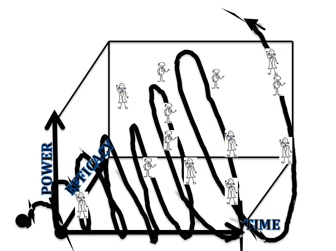What is Dialectical Storytelling Method?
By David M. Boje, Ph.D.
May 16 2016
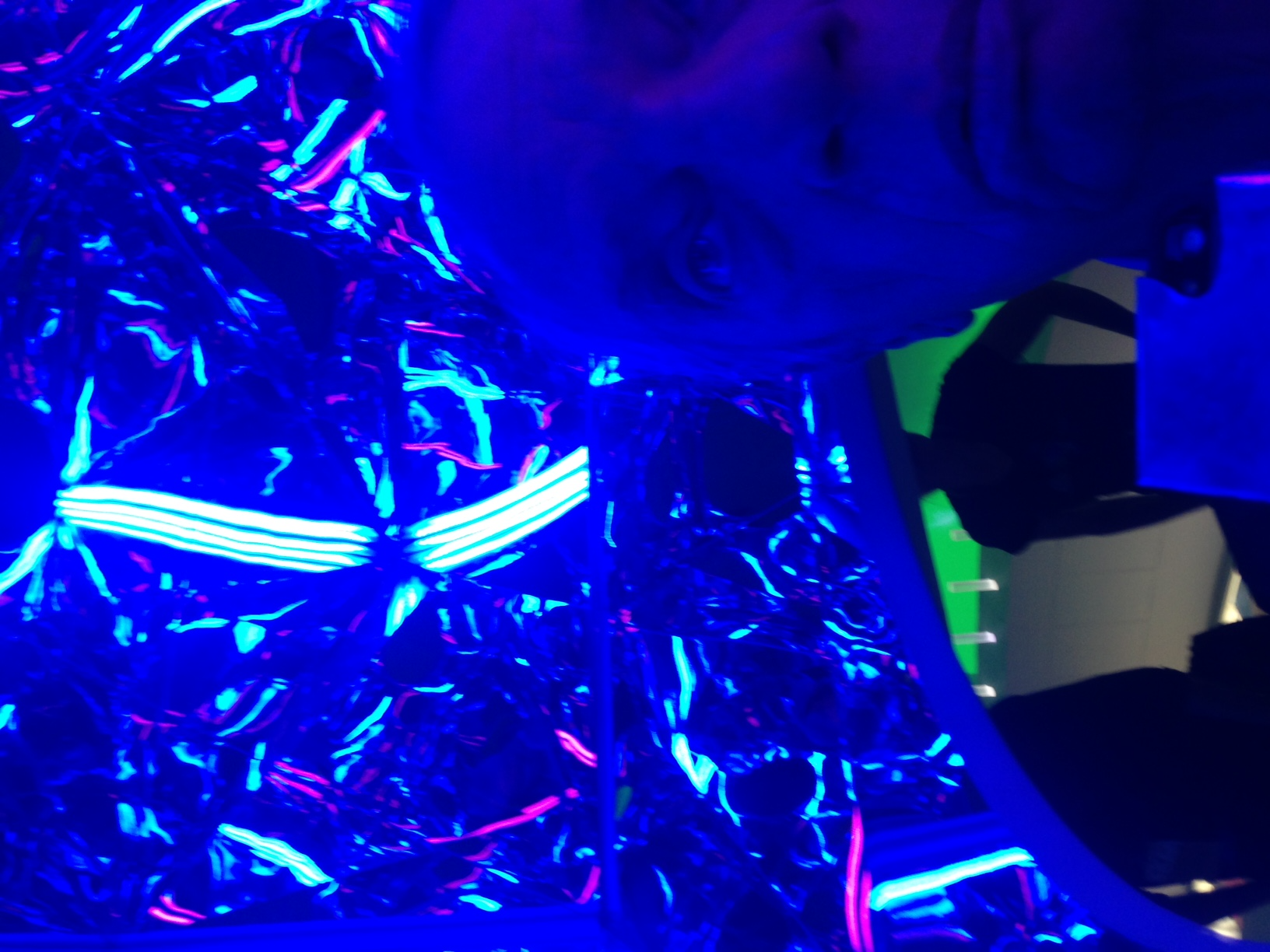
Me at the Ragnarock museum for Rock and Roll in Denmark June 2 2016
In early work on Antenarrative (2001) I linked it to traditional narrative tools and methods
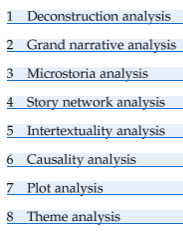
Then in 2008 I went deeper into Dialogical Methods
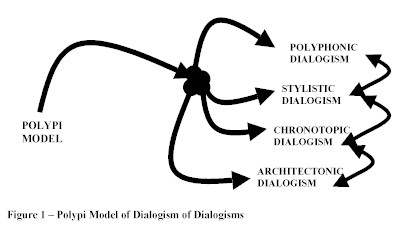 2008 Storytelling Organizaitons, Sage, 2008 Order here ; Press Release ; Book Review ; Published book review 2009
2008 Storytelling Organizaitons, Sage, 2008 Order here ; Press Release ; Book Review ; Published book review 2009
In 2014 I explored the pragmatism in COPE, expanding the ontologic methods with lots of Heidegger help. And this is where the fore-having, fore-concept, fore-structure, fore-sight, and fore-care got worked out so it might become methodology to investigate Antenarratives.
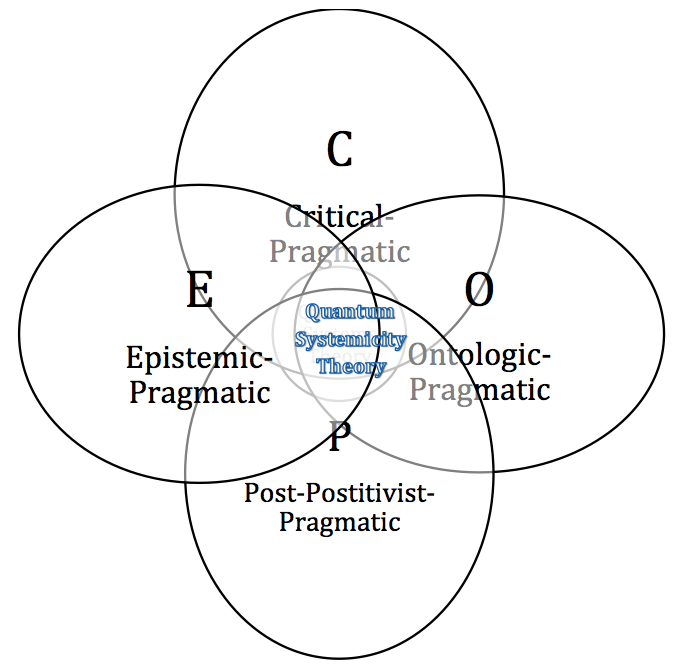
Now in 2016, I am working with Hegel, and developing what I call Dialectical Storytelling, and the Swainson's Hawk is helping me out. https://davidboje.com/hawk
I take a Hegelian approach to Dialectical Storytelling Method. In the dialectic of sensemaking (which is one of four dialectics), there is a "simple history of its movement of its experience" (Hegel, 1807: # 109). It is this movement
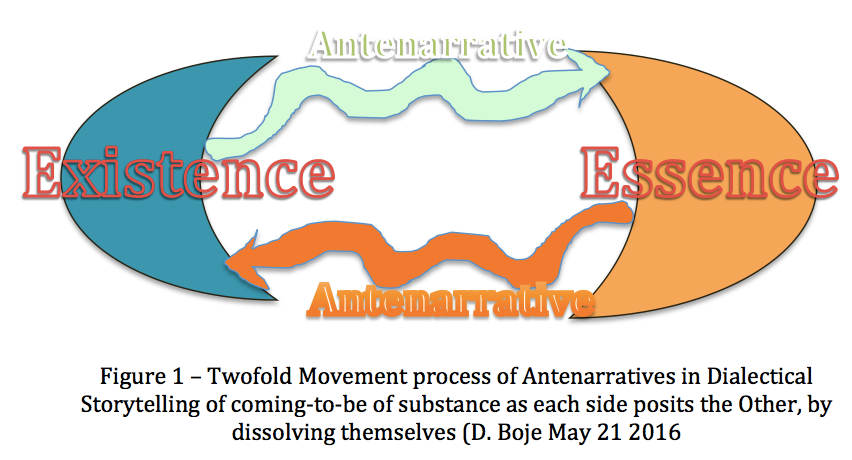
Available from Routledge May 2014; See Reviews; See Book Signing Flyer
“ It is clear that the dialectic of sense-certainty is nothing else but the simple history of its movement or of its experience, and sense-certainty itself is nothing else but just this history” (Hegel, G W F. “Phenomenology of Spirit”: # 109).
However, this sensemaking dialectic, includes not only retrospective learning, but a history of forgetting "forgetting it and starting the movement all ofer again" (Hegel, 1807: # 109). Therefore we start with the sensemaking dialectic of this Here, this Now, in direct experience, and learing, but also recognize the fluidity, whereby in storytelling, we get others accounts of other Heres, other Nows, we did not directly experience, and there is that forgetting of history, and starting all over again.
The second dialectic of interest is called Irritability, the third is Reproduction, and the fourth is School of Wisdom (see Dialectical Storytelling Theory page for explaination).
Hegel (1807: # 109) asserts that rather than relying on sense-certainty (sensemaking retrospective experience of 5 senses, the empirical of direct experience of the observing consciousness), one would be better off returning to the ancient School of Wisdom (Eleusian Mysteris of Ceres and Baccus is Hegel's example). In ancient Greed, people were initiated into these Mysteries, and came to doubt sensemaking experience, and even "to despair of it" (IBID, # 109). The School of Wisdom dialectic meant not idly standing in front of sensuous things as if possessed by thier intrinsic being-ness, but rather, learn that even the animals celebrate "open Mysteries" (IBID, # 109).
It is a history of sensemaking experience where the singular Here and Now of being-for-self experience is dialectically opposed and contradicted by the many other Heres and Nows.
“But this is still a conditioned being-for-self alongside which appears another being-for-self, the universality which is opposed to, and conditioned by singular being. But these two contradictory extremes are not merely alongside each other but in a single unity, or in other words, the defining characteristic common to both, viz. ‘being-for-self’, is burdened with opposition generally, i.e. it is at the same time not a ‘being-for-self” (Hegel, G W F. “Phenomenology of Spirit: #130)”
It is a history of experience of a medley of sensemaking opposed by intellectual representations.
“On the contrary, consciousness itself is the absolute dialectical unrest, this medley of sensuous and intellectual representations whose differences coincide, and whose identity is equally again dissolved, for it is itself determinateness as contrasted with the non-identical” (Hegel, G W F. “Phenomenology of Spirit: #205).
In sum, the Here and Now of direct empirical sensemaking experience, that singulairty is a negativity, opposed by all the differences of a multiplicity and plurality of other Heres and Nows: “for it is the negativity of all singularity and all difference” (Hegel, G W F. “Phenomenology of Spirit: #205).
Dialectical Storytelling Method demonstrates itself along of path of "dialectic movent" of "'meaning', perceiving and understanding, otherness as an intrinsic being vanishes" (Hegel, 1807: # 233). In the Dialectical Storytelling Method, the movement is one of working out from under "lordship and bondage" to attain freedom thorugh liberation that "comes from Scepticism" of the consciousness divided against itsel.
“It demonstrates itself to be this along the path in which first, in the dialectic movement of ‘meaning’, perceiving and understanding, otherness as an intrinsic being vanishes. Then, in the movement through the independence of consciousness in lordship and bondage, through the conception of freedom, through the liberation that comes from Scepticism and the struggle for absolute liberation by the consciousness divided against itself, otherness, in so far as it is only for consciousness, vanishes for consciousness itself” (Hegel: # 233).
For Hegel (1807: # 438) "Reason is Spirit" and the "coming-to-be of Spirit was indicated in the immediately prceding moveemnt in which the object of consciousness, the pure category, rose to the Notion of Reason."
In Dialectical Storytelling Method, Reason/Spirit is represented falsely by isolated [grand] narrative abstractions, which are removed from "the dialectical development" (Hegel, 1807: # 440). The Dialectical Storytelling Method is therefore is a study of how Reason imposes itself "as a category on material not intrinsically categorized" (IBID, # 440). This is where Dialectical Storytelling Method can pursue ethical substance: "When Spirit sees itself and its world as being Reason it becomes ethical substance actualized” (IBID, # 440).
The antenarrative process path of its movement lies behind, above, below initial sensemaking dialectic, much of whose history has been forgotten, but can beintuitively remaining in the absolute unrest at the passing away of the ethical order (para, Hegle, 1807: #701).
Finally, Dialectical Storytelling Method allows for proposing laws and maxims of conduct, buty these can be circumvented.
“The power of dialectic knowledge puts specific laws and maxims of conduct at the mercy of the pleasure and frivolity of youth which is led astray by it, and provides weapons for deceiving old age with its fears and apprehensions and which is restricted to life in its individual aspect” (Hegel, G W F. “Phenomenology of Spirit: # 746).
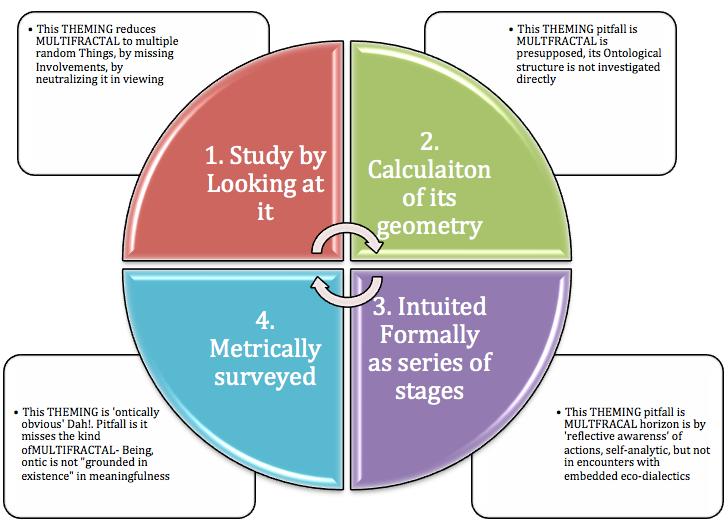
Four Ways Not to Study Multifractality in Organizations (D Boje, May 24 2016)
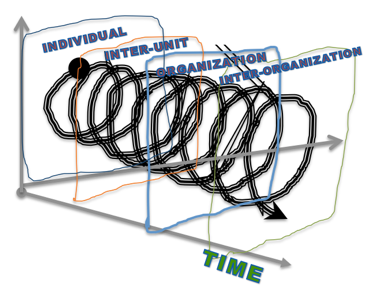
Figure 4 – Contrast a 3D Nonaka Knowledge Management (slinky-like) Spiral model with a 3D Fibonacci-fractal-spiral model (Drawings by Boje, used by permission). See Henderson & Boje (2015) for more on this topic
